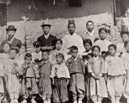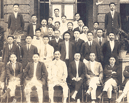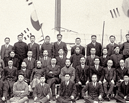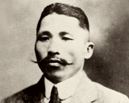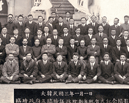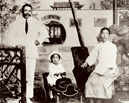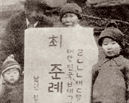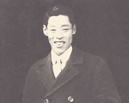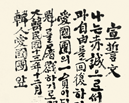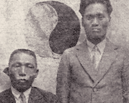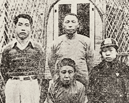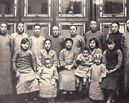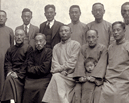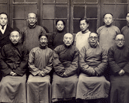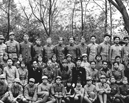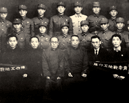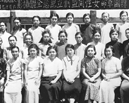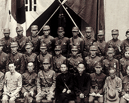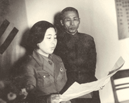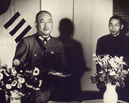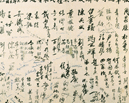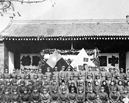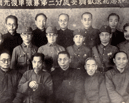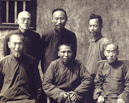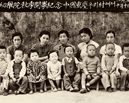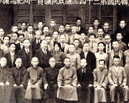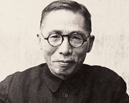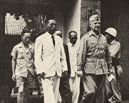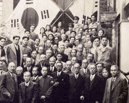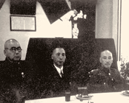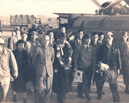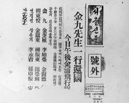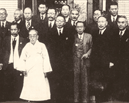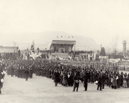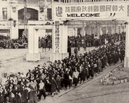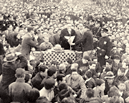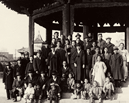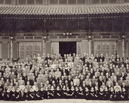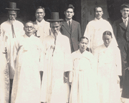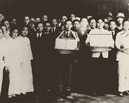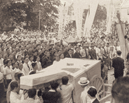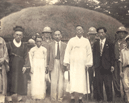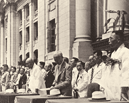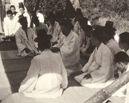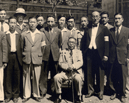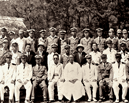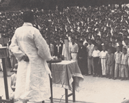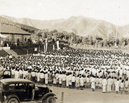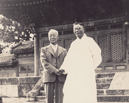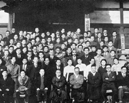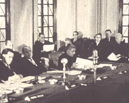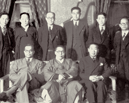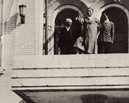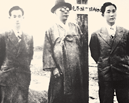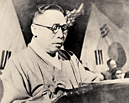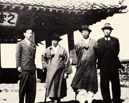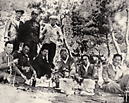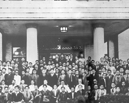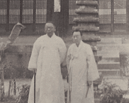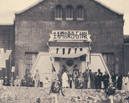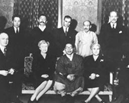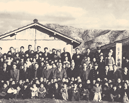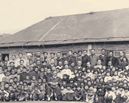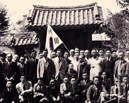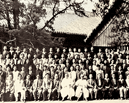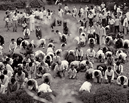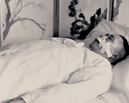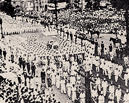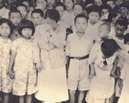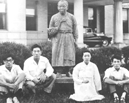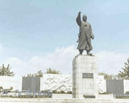With other teachers of Gwangjin School in Jangyeon, Hwanghae Province (1906)
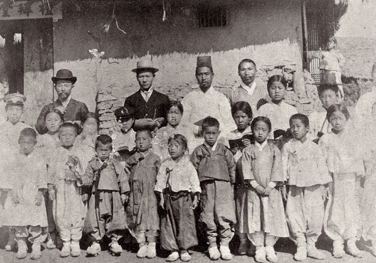 First line, from left : ○ · ○ · Lee Hogyun · ○ · Choi Taeyoung
First line, from left : ○ · ○ · Lee Hogyun · ○ · Choi TaeyoungSecond line, from left : ○ · Son Younggon · Baek Namhoon · Choi Sangyoon · Kim Gu
When I advised him to teach his children, he said cutting hair was the problem. The purpose of education is not to cut hair, but to cultivate talented people so that they can be part of a perfect sovereign nation in the future, to strengthen the weak country and bring light out of darkness. However, he thought I was talking about Catholicism, and he shunned the conversation, saying that there were people in his family who had joined the Jesuits.
Curse you, the gentry of Haeju West Village!
Where have you put your brazen arrogance in these days to have treated the lower class as slaves like a cow or horse while bragging their family lineage of royal servants!
Damn you, people of the lower classes in West Village of Haeju!
For a long time of five-hundred years, you were even not allowed to smoke a cigarette or cough freely before the gentry but now you can be the modern gentry fresher than the rotten traditional gentry!
The traditional gentry have been benefited generation to generation by serving a king in person but the modern gentry would transmit gospels to next generations of twenty-million people in this land. What the great gentry they are!
When I came back home carrying with a magic lantern, I gathered all villagers both the gentry and the lower classes, and cried out, “Wake up, the gentry! Wake up the lower classes, too!” From ‘Paikbum Ilji’
Celebrating the 6th Korean Provisional Congress (1919.9.17)
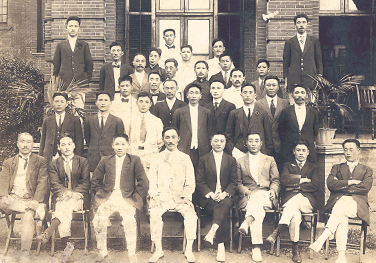 First line, from left : Lee Yoopil · Shin Ilhee · Yoon Hyeonjin · An Changho · Son Jeongdo · Jeong Ingwa · Choi Chansik · Lee Chunsook
First line, from left : Lee Yoopil · Shin Ilhee · Yoon Hyeonjin · An Changho · Son Jeongdo · Jeong Ingwa · Choi Chansik · Lee ChunsookSecond line, from left : Cha Gyunsang · ○ · ○ · Go Ilcheong · ○ · Kim Gu
Third line, from left : ○ · Kim Byeongjo · Lee Wonik · Na Yonggyun · Kim Hongseo
Fourth line, from left : Yeo Woonhyeong · Jang Boong · Wang Samdeok · Hwang Jinnam
Fifth line, from left : ○ · Cho Wangu · Jeon Jaesoon · ○
New Year’s Day Celebration of the Provisional Government of the Republic of Korea (1920.1.1)
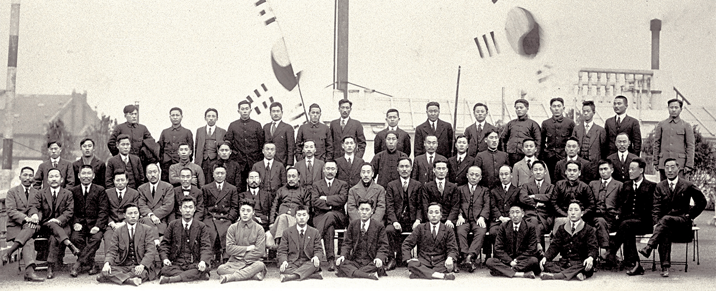
Second line, from left : Kim Gu · Yang Heun · Do Inkwon · Kim Yeojae · Lee Yoopil · Kim Byeongjo · Son Jeongdo · Shin Kyusik · Lee Dongnyeong · Lee Donghwi · Lee Siyoung · An Changho · Kim Chul · Kim Lip · Jang Gunsang · Yoon Hyunjin · Shin Ikhee · Lee Kyuhong · Lee Chunsook · Jeong Ingwa
Third line, from left : Kim Yongjeong · Cha Wonyeo · Han Eunghwa · Kim Taejoon · Shin Deokman · Lee Kyuseo · Kwon Taeyong · ○ · Lim Deuksan · Hwang Haksoo · Kim Bokhyeong · Cho Bonggil · Yoon Changman · Park Inguk · Lee Wonik
Fourth line, from left : Kim Heejoon · Choi Jinseok · Jeong Jaehyeong · Kim Deokseon · Myeong Soonjo · Kim Younghee · Kim Boyeon · Hwang Jinnam · Kim Hongseo · Jeong Taehee · Kim Hongwoon · Jang Wontaek · Yoo Heunghwan · Kim Boongjoon · Jang Singuk
Paikbum Kim Gu, former head of the Police of the Provisional Government of the Republic of Korea
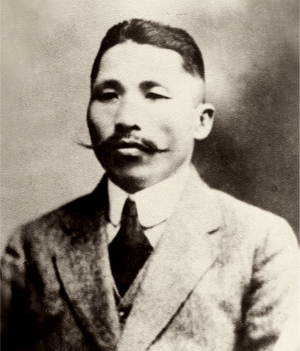 Kim Gu, who wanted to be the gatekeeper of the Provisional Government, was assigned to the Head of Police Department whose duties were preventing Jap’s spying activities, detecting Movement members’ improper contacts with Japs if any, and conducting surveillance over Jap’s operation to infiltrate into the Government, among many other responsibilities.
Kim Gu, who wanted to be the gatekeeper of the Provisional Government, was assigned to the Head of Police Department whose duties were preventing Jap’s spying activities, detecting Movement members’ improper contacts with Japs if any, and conducting surveillance over Jap’s operation to infiltrate into the Government, among many other responsibilities.
New Year’s Day Celebration for the Provisional Government of the Republic of Korea and the Korean Provisional Congress (1921.1.1)
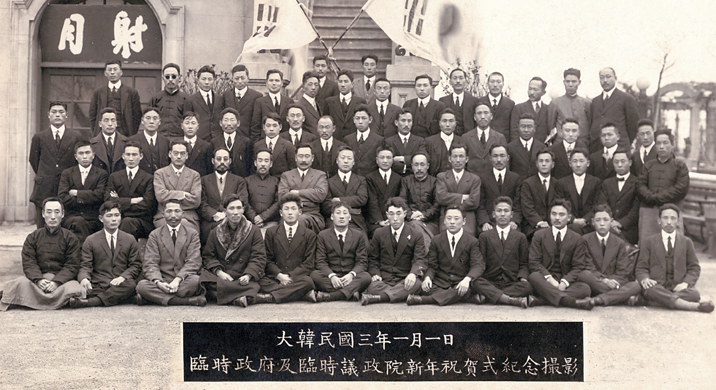
Second line, from left : Lee Kyuhong · Kim Chul · Shin Ikhee · Shin Kyusik · Lee Siyoung · Lee Donghwi · Rhee Syngman · Son Jeongdo · Lee Dongnyeong · Nam Hyeongwoo · An Changho · Oh Youngseon · Yoon Hyunjin · Seo Byeongho · Cho Wangu
Third line, from left : ○ · Lim Byeongjik · ○ · Kim Bokhyeong · Do Inkwon · Choi Geunwoo · Kim Injeon · Lee Wonik · Jeong Kwangho · Kim Taeyeon · Lee Bokhyeon · ○ · Kim Hongseo · Na Yonggyun · Hwang Jinnam · Kim Jeongmok
Fourth line, from left : ○ · Wang Samdeok · Cha Gyunsang · Kim Yeojae · An Byeongchan · Jang Boong · Kim Seokhwang · Lee Kyuseo · Kim Yongchul · ○ · Song Byeongjo · Yang Heun · Cho Dongho · Lee Yoopil
The Family Photo of Paikbum Kim Gu (1921)
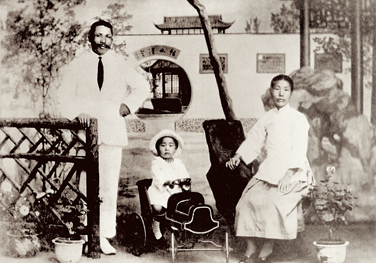 From left : Kim Gu, the eldest son In, wife Choi Joonrae
From left : Kim Gu, the eldest son In, wife Choi JoonraeIn the second year of the Republic of Korea(1920), my wife came to Shanghai with In and we lived together. Back in homeland, my mother stayed with my mother-in-law in Dongsanpyeong, and when my mother-in-law passed away, she was buried in the cemetery. In the fourth year of the Republic of Korea (1922), they all moved to Shanghai, where we had a happy family. In August of that year, Shin was born.
( … )
In the meantime, after my wife gave birth to Shin, she contracted pneumonia caused by a fall, and after suffering for several years, she was examined at Shanghai’s Boryung Hospital, and then isolated and hospitalized at the Hongkou Lung Hospital, which was equipped with Western facilities. We said our last goodbyes at the Boryung Hospital, and on January 1, the sixth year of the Republic (1924), she passed away at the Hongkou Hospital. I buried my wife in the cemetery at the back of the police station on Soongshan Road in the French concessions of Shanghai.
From Paikbum Ilji
을
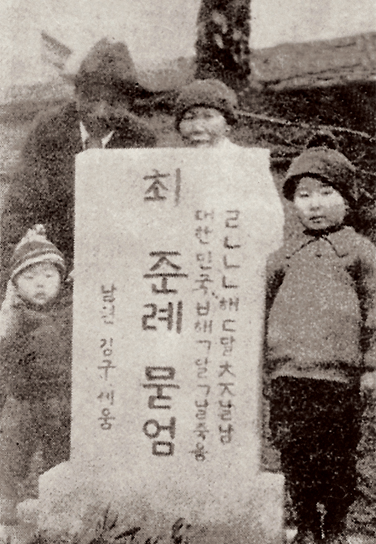 From left : Shin · Kim Gu · Kwak Nakwon · In
From left : Shin · Kim Gu · Kwak Nakwon · In
A tombstone for mourning
This photo shows a headstone erected on the grave of Mrs. Choi Joonrae, the wife of Kim Gu, who, as reported earlier, passed away in a country far away after meeting her husband who suffered endless hardships and struggles for the sake of the society. This tombstone was set up by her compatriots in Shanghai, after they raised fund for it, in order to commemorate her devotion to her family and society of forty years of life encountering and overcoming economic and social adversities., Korean linguist Kim Doobong authored epitaph in Korean as inscribed on the stone. The old lady behind this tombstone is her mother-in-law, Mrs. Kwak (age 66), the man in the hat is her husband, Kim Gu (age 49), the child on the right is her elder son, Kim In (age 5), and the child on the left is the younger son Kim Shin (age 2). How could she close her eyes in peace, leaving behind an old mother-in-law, young children and husband who has a lot of things to do! As she is buried alone in a lonely foreign, soil, this lonely standing tombstone makes us more grieved and mournful.
From DongA Ilbo, February 18, 1924
After Setting up a Tombstone for Wife, Choi Joonrae (1924)
 From left : Shin · Kim Gu · Kwak Nakwon · In
From left : Shin · Kim Gu · Kwak Nakwon · InA tombstone for mourning
This photo shows a headstone erected on the grave of Mrs. Choi Joonrae, the wife of Kim Gu, who, as reported earlier, passed away in a country far away after meeting her husband who suffered endless hardships and struggles for the sake of the society. This tombstone was set up by her compatriots in Shanghai, after they raised fund for it, in order to commemorate her devotion to her family and society of forty years of life encountering and overcoming economic and social adversities., Korean linguist Kim Doobong authored epitaph in Korean as inscribed on the stone. The old lady behind this tombstone is her mother-in-law, Mrs. Kwak (age 66), the man in the hat is her husband, Kim Gu (age 49), the child on the right is her elder son, Kim In (age 5), and the child on the left is the younger son Kim Shin (age 2). How could she close her eyes in peace, leaving behind an old mother-in-law, young children and husband who has a lot of things to do! As she is buried alone in a lonely foreign, soil, this lonely standing tombstone makes us more grieved and mournful.
From DongA Ilbo, February 18, 1924
Lee Bongchang (1931)
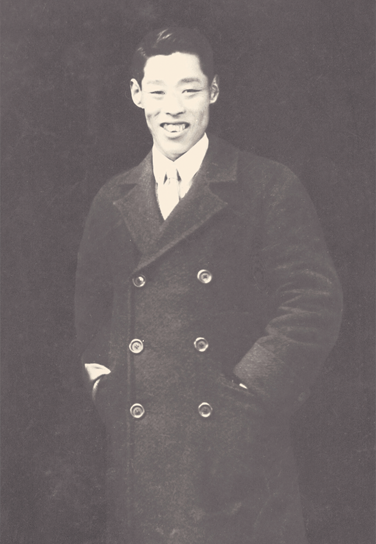 Patriot Lee Bongchang(1931)
Patriot Lee Bongchang(1931) “I am thirty-one years old, and even if I were to live another thirty-one years, what interest would there be in an old life compared with the wandering life I have had in the past? If the purpose of life is pleasure, I have tasted a good deal of it in thirty-one years, and therefore I have come to Shanghai to devote myself to our independence in order to obtain eternal pleasure.”
( … )
And when we went to the photo studio to have our pictures taken, I might have my face shadowed by a sad hue. He consoled me saying that. “I’m on my way to enjoy eternal pleasure, so let’s take a picture of the two of us with happy faces.” I had to take a picture with a happy smile, too.
From Paikbum Ilji
Oath of Lee Bongchang (1931.12.13)
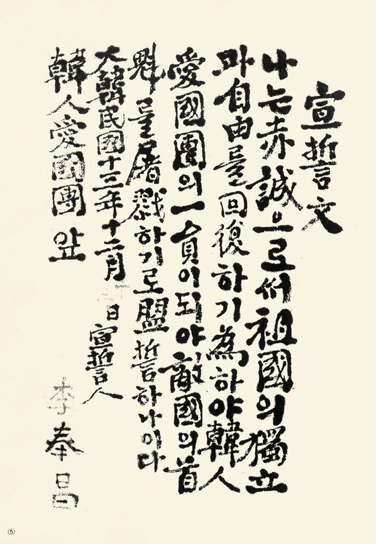 I sincerely swear to become a member of the Korean Patriotic Organization to restore the independence and freedom of my country and to slaughter the head of the enemy state of my country.
I sincerely swear to become a member of the Korean Patriotic Organization to restore the independence and freedom of my country and to slaughter the head of the enemy state of my country. December 13, in the 13th year of the Republic of Korea
Sworn by Lee Bongchang
Before the Korean Patriotic Organization
(Possessed by the National Museum of Korea)
The Korean Patriotic Organization Leader Kim Gu and Member Yoon Bonggil (1932.4.27)
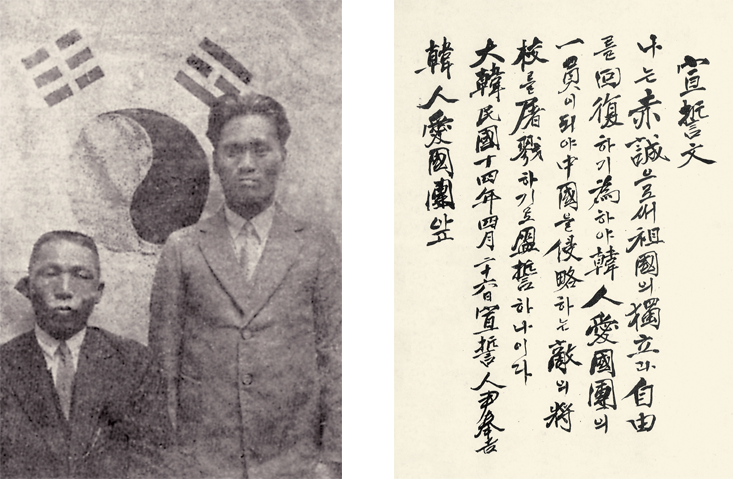
Oath of Patriot Yoon Bonggil (April 26, 1932/Possession of the National Museum of Korea)
The old laborer said to the young man in a solemn tone, “Your life will soon end I sincerely hope that you will stay forever with the brilliant success that will be achieved at the expenses of your life for the liberation of our country and the freedom of our people. The last words I have to give you is that since our sole enemy is the Jap’s authority, you must be very cautious in the execution of your plans in order not to harm any non-Japs. Now, I give you two bombs. The first one shall be used for toppling the commander of the enemy and the other for terminating your life.”
The young men replied, “I will sincerely follow your instructions. I hope you must look after yourself for the future of our country while you never cease fight for the independence And the old laborer added, “My friend, we will meet again in the next life cycle! So the two men shook hands and parted. Hot tears streamed down their faces. Alas, at the time on that day, who witnessed such a heroic scene?
From Dowaesilgi
Family Photo (Nanjing[Beijing], 1934)
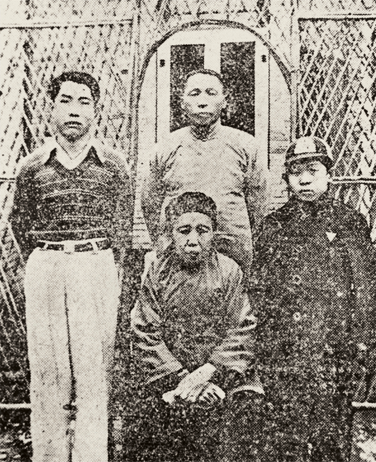 From left : In · Kim Gu · Kwak Nakwon · Shin
From left : In · Kim Gu · Kwak Nakwon · Shin After the bombing incident executed by patriot Yoon Bonggil in Hongkou Park, Shanghai, as my mother came to China with my elder son, In, and younger one, Shin, the family was reunited for the first time in nine years.
‘It happened when my mother was in Nanjing. Upon learning that young and senior comrades were preparing my mother’s birthday party, my mother asked them to give her money for the party with the reason that she would rather prepare foods for them and they responded to it but she bought guns with the money and send them to comrades to use them for the independence movement.
From Paikbum Ilji
At Chu Pungjang’s Home during the Exile in Jiaxing (1935)
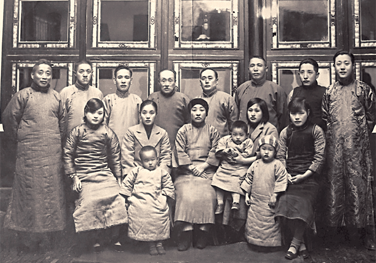 From the child on the left : Kim Jadong(son of Kim Euihan) · Um Kidong(son of Um Hangseop) · Um Kiseon(daughter of Um Hangseop)
From the child on the left : Kim Jadong(son of Kim Euihan) · Um Kidong(son of Um Hangseop) · Um Kiseon(daughter of Um Hangseop)First line, from left : Shi Siwooseong[?:wife of Chun Tungseong] · Jeong Jeonghwa(wife of Kim Euihan) · Mother of Min Younggu · Yeon Midang(wife of Um Hangseop) · Ju Jarui[?:wife of Chupungjang]
Second line, from left : Chun Tungseong[陳桐生:adopted son of Jeo Boseong] · ○ · Kim Euihan · Lee Dongnyeong · Park Chanik · Kim Gu · Um Hangseop · Chu Pungjang[?鳳章:son of Chu Pungjang]
At During the Move of the Provisional Government (Jiaxing[嘉興], 1935.11)
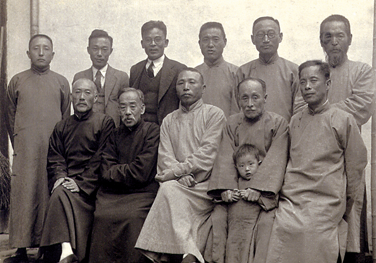 First line, from left : Song Byeongjo · Lee Siyoung · Kim Gu · Lee Dongnyeong · Um Kisoon(second daughter of Um Hangseop) · Cho Wangu
First line, from left : Song Byeongjo · Lee Siyoung · Kim Gu · Lee Dongnyeong · Um Kisoon(second daughter of Um Hangseop) · Cho WanguSecond line, from left : Um Hangseop · Yang Woojo · ○ · An Gonggeun · Cha Riseok · Cho Seonghwan
Celebrating Song Byeongjo’s 60th Birthday (1937)
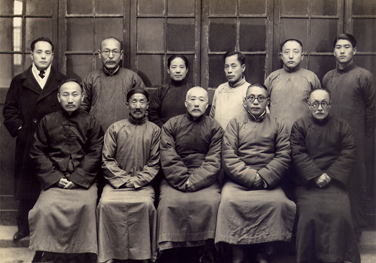 First line, from left : Cha Riseok · Lee Deokhae(Father-in-law of Cho Seonghwan) · Song Byeongjo · Kim Gu · Lee Dongnyeong
First line, from left : Cha Riseok · Lee Deokhae(Father-in-law of Cho Seonghwan) · Song Byeongjo · Kim Gu · Lee DongnyeongSecond line, from left : Um Dohae · Cho Seonghwan · Lee Sookjin · Cho Wangu · Um Hangseop · Jin Chunho
Members of the Korean Liberation Front Youth Corps., the predecessor of the Korean Liberation Army (1939.4.4)
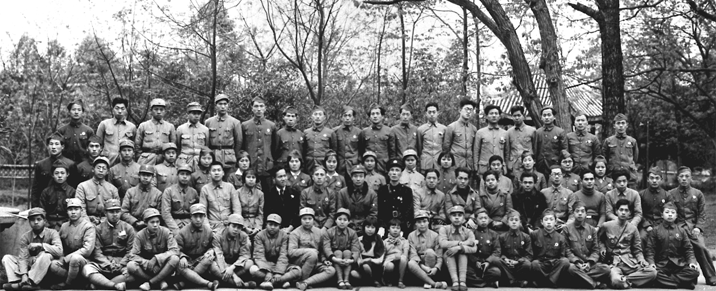
Second line, from left : Ji Jeonggye · ○ · ○ · ○ · ○ · ○ · ○ · Go Woonki(the leader) · Leader Yo · ○ · ○ · ○ · ○ · ○ · Dr. Yang ·○ · ○ · Noh Bokseon · Lee Woosong
Third line, from left : Kim Wonyeong · Jin Chunho · 2 Chinese · Song Jeongheun · Yeon Midang · Oh Kwangshim · Shin Soonho · Ha Sanggi(Chinese) · 3 Chinese · Kim Byeongin · Kim Hyosook · Oh Heeyoung
Fourth line, from left : Lee Jaehyeon · 4 Chinese · Cho Siwon · Jeon Taesan · Han Daewon · Ma Chogoon · Lee Hayoo · Min Younggu · 4 Chinese · Park Youngjun · Yoo Pyeongpa · Ji Dalsoo
Farewell Ceremony of the Korean Liberation Front Youth Corps. (1939.11.17)
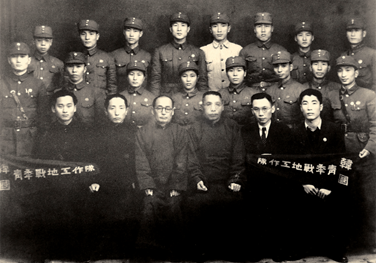 First line, from left : Park Youngjun(son of Park Chanik) · Um Hangseop · Park Chanik · Kim Gu · Yoo Jindong · Kim In(son of Kim Gu)
First line, from left : Park Youngjun(son of Park Chanik) · Um Hangseop · Park Chanik · Kim Gu · Yoo Jindong · Kim In(son of Kim Gu)Second line, from left : Kim Dongsoo · Park Kiseong · Song Yeongjip(wife of Um Ikgeun) · Ha Sanggi(Chinese) · Wife of Pyeong Jiseong · Kim Jakseng · Um Ikgeun · Na Wolhwan
Third line, from left : Maeng Johwa · Lee Hayoo · Pyeong Jiseong · Kim Wonyoung · Cho Sijae · Hyun Yipyeong · Lee Jaehyeon · Joo Ji
Commemorative Photo of the founding of the Korean Revolutionary Women's Association (1940.6.17)
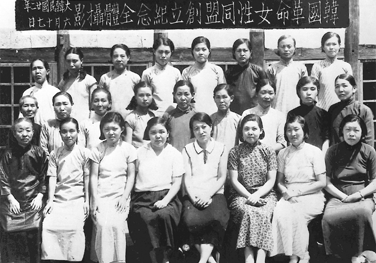 First line, from left : Mother of Min Pilho · Jeong Jeonghwa(wife of Kim Euihan) · Lee Kukyoung(wife of Min Younggu) · Kim Hyosook(wife of Song Myeonsoo) · Bang Soonhee(wife of Kim Kwanoh) · Kim Jeongsook(wife of Go Sibok) · Kim Byeongin(wife of Lee Joonsik) · Yoo Maeryae(wife of Choi Deokshin)
First line, from left : Mother of Min Pilho · Jeong Jeonghwa(wife of Kim Euihan) · Lee Kukyoung(wife of Min Younggu) · Kim Hyosook(wife of Song Myeonsoo) · Bang Soonhee(wife of Kim Kwanoh) · Kim Jeongsook(wife of Go Sibok) · Kim Byeongin(wife of Lee Joonsik) · Yoo Maeryae(wife of Choi Deokshin)Second line, from left : Wife of Son Ilmin · Cho Yongjae(brother of Cho Soang) · Oh Youngseon(wife of Cho Soang) · Song Jeongheun(iwfe of Yoo Pyeongpa) · Jeong Jeongsan(wife of Oh Kwangseon) · Oh Gunhae(wife of Shin Gunsik) · Wife of Choi Dongoh · Kim Soohyeon(wife of Lee Kwang) · Noh Youngjae(wife of Kim Boongjoon)
Third line, from left : Yoon Yongja(wife of Ji Cheongcheon) · ○ · Wife of Cho Seonghwan · Choi Sojeong(wife of Yang Woojo) · Oh Kwangshim(wife of Kim Hakkyu) · Yeon Midang(wife of Um Hangseop · Choi Hyeongrok · Lee Soonseung(wife of Cho Siwon)
After the Ceremony for the Establishment of the General Headquarters of the Korean Liberation Army (Gareung Bingwan, Chongqing, 1940.9.17)
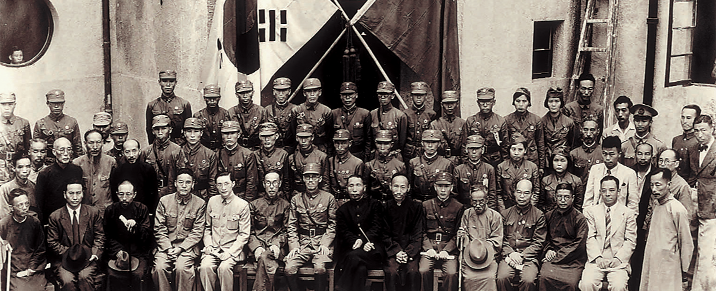
Second line, from left : ○ · Min Byeonggil · Song Byeongjo · Cho Soang · Choi Dongoh · Cho Injae · Kim Wonyoung
First line, from right : Cho Wangu · Park Chanik · ○ · ○ · Ji Bokyoung · Kim Jeongsook
Third line, from left : ○ · Kim Hakkyu
Third line, from right : An Nakseng · ○ · ○ · ○ · Lee Sangman · Yang Woojo · Cho Soonok · Oh Kwangshim · Lee Bokwon
Comrade Kim Jeongsook, Reading the Salutatory Statement at the Ceremony for the Establishment of the Korean Liberation Army’s General Headquarters (1940.9.17)
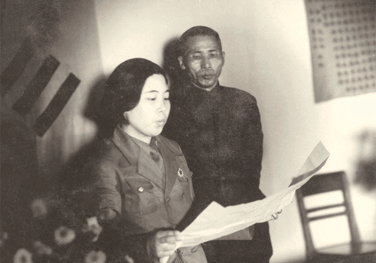 《 Declaration of the Korean Liberation Army 》
《 Declaration of the Korean Liberation Army 》‘... The Provisional Government of the Republic of Korea, pursuant to the Military Organization Act promulgated by the Government in the first year of the Republic(1919) … hereby declares that it has organized the Korean Liberation Army and established the General Headquarters of the Korean Liberation Army on September 17, the 22th year of the Republic of Korea (1940). The Korean Liberation Army will continue to fight as part of the allied forces to overthrow the common enemy, the Japanese imperialists, in order to restore the independence of our two nations in collaboration with the people of the Republic of China. During the past 30 years of Japanese occupation and rule over our homeland, the steadfast spirit of independence of our people has continued to lead a heroic struggle against the ruthless oppressor to free ourselves from dishonorable slavery … We are convinced, with great hope, that the time has come to strengthen our fighting forces for the independence of our nation.’
Commander-in-chief of Chongqing, Liu Zhi Congratulating the Establishment of the Korean Liberation Army General Headquarters during the Ceremony (1940.9.17)
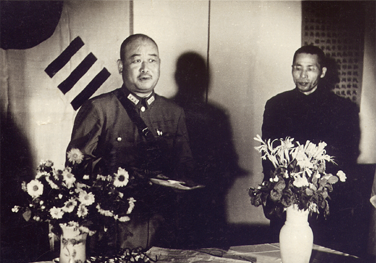 Liu Zhi, commander-in-chief of the Chinese Defense Force, is giving a congratulatory speech on behalf of the Chinese government. General Liu Zhi was the man who made the bomb for Lee Bongchang.
Liu Zhi, commander-in-chief of the Chinese Defense Force, is giving a congratulatory speech on behalf of the Chinese government. General Liu Zhi was the man who made the bomb for Lee Bongchang.
Guestbook of the Ceremony for the Establishment of the Korean Liberation Army’s General Headquarters (1940.9.17)
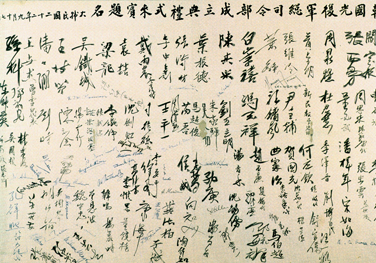 The ceremony for the establishment of the Korean Liberation Army General Headquarters was attended by more than 200 guests from inside and outside Korea. Representatives of various countries and Chinese officials including the Nationalist Party officials, Communist Party officials Zhou Enlai, Dong Biwu and other guests showed their expectations for the Korean Liberation Army.
The ceremony for the establishment of the Korean Liberation Army General Headquarters was attended by more than 200 guests from inside and outside Korea. Representatives of various countries and Chinese officials including the Nationalist Party officials, Communist Party officials Zhou Enlai, Dong Biwu and other guests showed their expectations for the Korean Liberation Army.(Collection of Independence Hall of Korea)
Korean Liberation Army the Fifth Subdivision (1941.1.1)
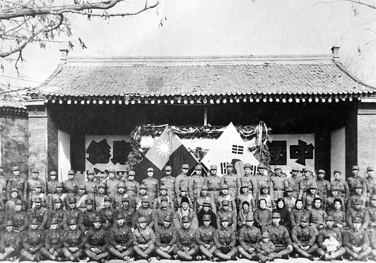 《 The Mission of the Korean Liberation Army 》
《 The Mission of the Korean Liberation Army 》- To eradicate all invasive political, military, economic, cultural, transportation, and other institutions of Japan in Korea.
- To purge all feudal and counter-revolutionary forces among domestic Koreans, and all those who flatter Japs.
- To break out current immoral trend and tainted customs.
- To establish the equal system in politics, economics and education (including achievement of nationalization of land, universal suffrage, state-funded education, extended compulsory education, etc.) based on the policy for foundation of the Republic of Korea.
- To realize the equality, different ethnic groups and as well as sovereign states.
- To promote cooperation for the peace and happiness of all mankind with entities that share reciprocal equality with us after having ties with them.
Commemorating Farewells to the Recruiting Committee Members of the Third Subdivision of the Korean Liberation Army (1941.3.6)
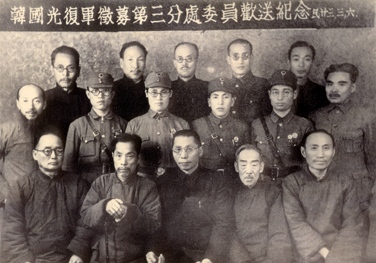 First line, from left : Park Chanik · Cho Wangu · Kim Gu · Lee Siyoung · Cha Riseok
First line, from left : Park Chanik · Cho Wangu · Kim Gu · Lee Siyoung · Cha RiseokSecond line, from left : Choi Dongoh · Kim Moonho · Shin Jeongsook · Han Domyeong · Lee Jiil · Kim Boongjoon
Third line, from left : Cho Seonghwan · Cho Soang · Ji Cheongcheon · Lee Beomseok · Yang Woojo
The 60th Birthday of Cho Wangu and Cha Riseok (Woorichon, Chongqing, 1941.9.23)
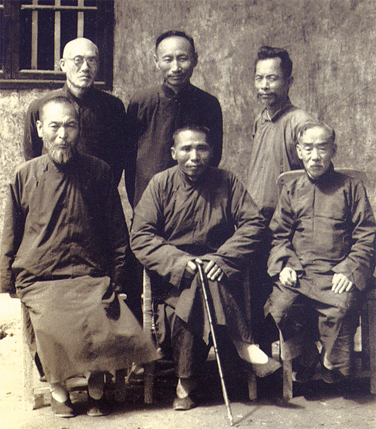 First line, from left : Cho Seonghwan · Kim Gu · Lee Siyoung
First line, from left : Cho Seonghwan · Kim Gu · Lee SiyoungSecond line, from left : Song Byeongjo · Cha Riseok · Cho Wangu
Celebrating the Starting Fall Semester of the March 1 Kindergarten (Woorichon, Chongqing, 1941.10.10)
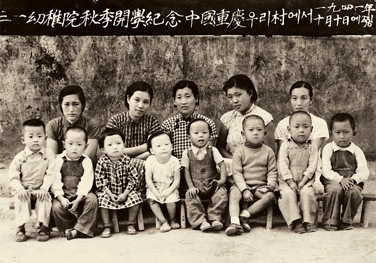 First line, from left : Lee Donggil · Um Kinam · Yoo Sooran · Choi Joae · Yoo Soosong · Chae Sooyoung · Oh Younggul · Kim Jonghwa
First line, from left : Lee Donggil · Um Kinam · Yoo Sooran · Choi Joae · Yoo Soosong · Chae Sooyoung · Oh Younggul · Kim JonghwaSecond line, from left : Yeon Midang · Kang Youngpa · Kim Byeongin(wife of Lee Joonsik) · Lee Kukyoung(wife of Min Younggu) · Jeong Jeonghwa
Members of the 34th National Congress (1942.10.25)
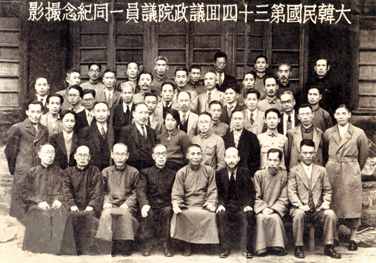 First line, from left : Yoo Dongyeol · Park Chanik · Cho Seonghwan · Hong Jin · Kim Gu · Choi Dongoh · Cho Wangu · Kim Wonbong
First line, from left : Yoo Dongyeol · Park Chanik · Cho Seonghwan · Hong Jin · Kim Gu · Choi Dongoh · Cho Wangu · Kim WonbongSecond line, from left : Wang Tong · Yoon Jingwoo · Cha Riseok · Cho Soang · Bang Soonhee · Lee Bokwon · Kim Euihan · Shim Kwangsik · Yoo Jindong · Choi Seongoh
Third line, from left : Lee Heunggwan · Lee Jeongho · Yoo Jamyeong · Yang Woojo · Kim Seongsook · Song Wookdong · Han Jiseong · Shin Ikhee · Park Gunwoong
Fourth line, from left : Lee Doosan · Go Woongi · Lee Haemyeong · Yoo Rim · Um Hangseop · Lee Sangjeong · Shin Youngsam · Kim Jaeho · Lee Joonsik · Lee Sangman · Lee Jipjoong
Fifth line, from left : Shin Gunsik · Cho Gyeonghan · Moon Ilmin · Kim Sangdeok · Kang Hongdae · Kim Kwanoh · Choi Seoksoon
The 34th National Congress of the Republic of Korea was composed of members from various political parties, including the Korea Independence Party, and Korean Democratic Party, as well as independents.
Paikbum Kim Gu during Chongqing period
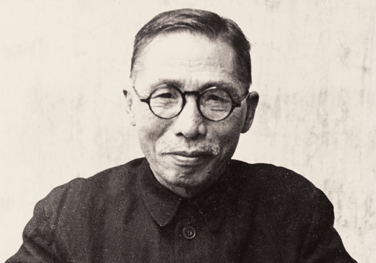 "We are in a revolutionary period to win sovereign independence of our nation with the nation-wide united power. Since a revolution is a power struggle to defeat a strong power with weaker one, it can’t be achieved in an easy way. Thus, we, revolutionists, must realize that we do not have any other choice but to fight until we achieve the final goal so as to make justice for all mankind and our steadfast belief for independence come true. Revolutionist should always maintain an optimistic manner while living in such an environment.
"We are in a revolutionary period to win sovereign independence of our nation with the nation-wide united power. Since a revolution is a power struggle to defeat a strong power with weaker one, it can’t be achieved in an easy way. Thus, we, revolutionists, must realize that we do not have any other choice but to fight until we achieve the final goal so as to make justice for all mankind and our steadfast belief for independence come true. Revolutionist should always maintain an optimistic manner while living in such an environment. From Quotation of Paikbum
Kim Gu Exiting the Main Gate of the 2nd Subdivision of the Korean Liberation Army after Discussing the Operation of Advancing on Occupied Korea with General W. J. Donovan, Commander of OSS, (Xi’an[西安], 1945.8.7)
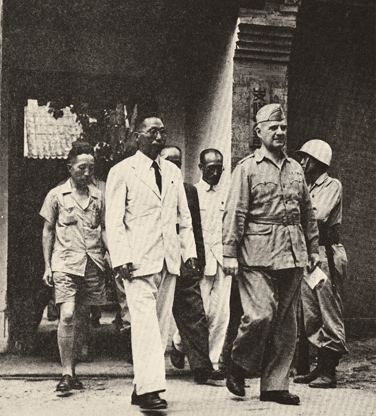 From left : Um Hangseop(Head of promotion division of the Provisional Government) · Kim Gu · Ji Cheongcheon(Chief of the Korean Liberation Army) · Lee Beomseok (Commander of the second subdivision of the Korean Liberation Army) · Director Donovan(Head of OSS)
From left : Um Hangseop(Head of promotion division of the Provisional Government) · Kim Gu · Ji Cheongcheon(Chief of the Korean Liberation Army) · Lee Beomseok (Commander of the second subdivision of the Korean Liberation Army) · Director Donovan(Head of OSS)
Celebrating the Return of the Provisional Government of the Republic of Korea (Provisional Government Building in Chongqing, 1945.11.3)
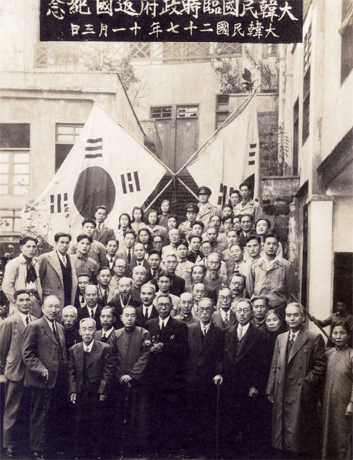
Farewell Party for the Korean Provisional Government by the Chinese Nationalist Party (Great Hall of the Nationalist Party of China, 1945.11.4)
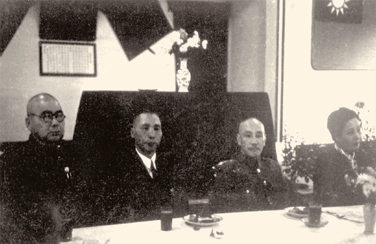 Feng Yuxiang[馮玉祥] · Kim Gu · Chiang Kai-shek[蔣介石] · May-Ling Soong[宋美齡]
Feng Yuxiang[馮玉祥] · Kim Gu · Chiang Kai-shek[蔣介石] · May-Ling Soong[宋美齡]
Airfield in Jiangwan, Shanghai (1945.11.5)
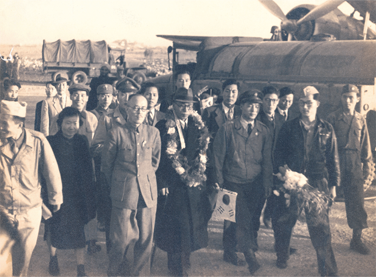 First line, from left : An Miseng · Kim Gu · Ji Cheongcheon · Lee Younggil
First line, from left : An Miseng · Kim Gu · Ji Cheongcheon · Lee Younggil
Breaking-news Edition of Newspaper Reporting the Repatriation of the Members of the Provisional Government and Kim Gu
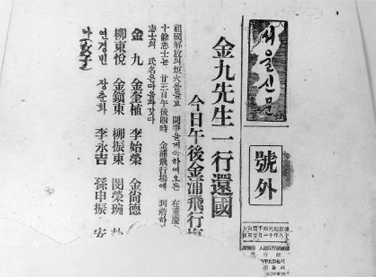 《Seoul Shinmun》 November 23, 1945.
《Seoul Shinmun》 November 23, 1945.
Second Repatriation Batch of the Members of the Provisional Government (Gyeonggyojang, 1945.12.6)
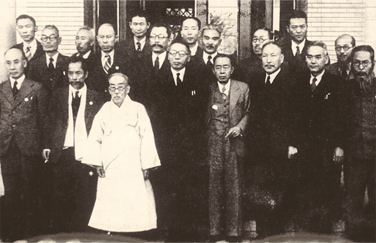 First line, from left : Jang Gunsang · Cho Wangu · Lee Siyoung · Kim Gu · Kim Kyusik · Cho Soang · Shin Ikhee · Cho Seonghwan
First line, from left : Jang Gunsang · Cho Wangu · Lee Siyoung · Kim Gu · Kim Kyusik · Cho Soang · Shin Ikhee · Cho SeonghwanSecond line, from left : Yoo Jindong · Hwang Haksoo · Seong Joosik · Kim Seongsook · Kim Sangdeok · Yoo Rim · Cho Kyeonghan · Kim Boongjoon · Yoo Dongyeol · Kim Wonbong · Choi Dongoh
Welcoming Celebration for the Repatriation of the Provisional Government (Seoul Stadium, 1945.12.19)
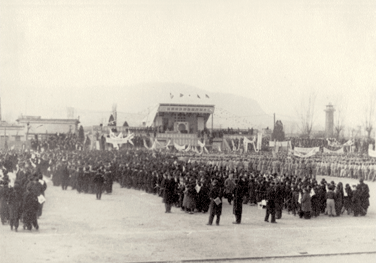 “Dear my compatriots,
“Dear my compatriots, On this welcoming occasion, first of all, I would like to express my sincere respect, on behalf of the Provisional Government, to you, brethren in homeland, in that you have overcome all kinds of pains and adversities sustained under the Japanese rule for a substantial amount of time.
(….)
As you know, the Provisional Government was the sole government founded in the midst of the Great 3.1 Revolution that fought with people’s blood. The Provisional Government was indeed organized by the consensus of all Koreans and at the same time it was the only hostile power against Jap’s occupation of Korea.
. Therefore, the Provisional Government has consistently held the stance of Korean people’s unity and the principle of democracy by succeeding to the spirit of the Revolution during the last 27 years. That is, the Provisional Government was never a government of a class or faction but it was the unified democratic government based on common understandings of all people, all classes and all parties. As such, the sole and utmost goal of the Government was to crush the Japanese imperialism and further found the genuine democratic republic state in Korea under the unity of all Koreans. However, although we strove to fight the enemy strenuously, as a consequence, we couldn’t achieve our complete independence at all and had to return home holding only with a sheet of allies’ statement that would guarantee independence in an appropriate time. In this environment, I would say that it is really regrettable and shameful for me to be warmly welcomed by my brethren.
(….)
The most urgent and profound mission for us at this moment is to create our sovereign independent state on the foundation of our liberated land and people.
From Quotation of Paikbum
Citizen’s March to Celebrate the Return of the Provisional Government of the Republic of Korea (1945.12.19)
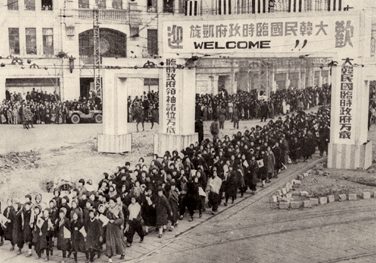
Anti-trusteeship Nation-wide Rally (Seoul Stadium, 1945.12.31)
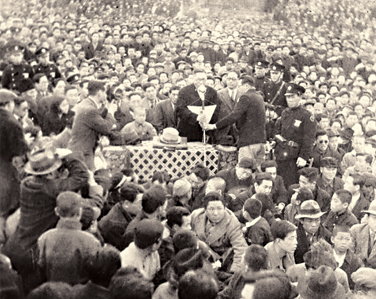 “... The conclusion will be that a four-power trusteeship of Korea is a four-power union. Then those who oppose the trusteeship will be righteous and patriotic, not obstructors or reactionaries of independence. This is a dangerous reasoning which could produce a new pro-Japan faction like Iljinhoe … While some of use oppose the trusteeship in their mind but with a wrong recognition that a negative effect would come out even if we, the weaker side, oppose the trusteeship, they insist to solicit the four-powers, after obtaining their generosity by submitting to them, to provide us independence five years later as promised because the promise is the internationally fixed fact,. However, some other weaker states appeal to invalidate even ratified treaties if they feel like it is unequal and eventually make it satisfied. There is no reason for us not to appeal to all other nations what we would like to do so.
“... The conclusion will be that a four-power trusteeship of Korea is a four-power union. Then those who oppose the trusteeship will be righteous and patriotic, not obstructors or reactionaries of independence. This is a dangerous reasoning which could produce a new pro-Japan faction like Iljinhoe … While some of use oppose the trusteeship in their mind but with a wrong recognition that a negative effect would come out even if we, the weaker side, oppose the trusteeship, they insist to solicit the four-powers, after obtaining their generosity by submitting to them, to provide us independence five years later as promised because the promise is the internationally fixed fact,. However, some other weaker states appeal to invalidate even ratified treaties if they feel like it is unequal and eventually make it satisfied. There is no reason for us not to appeal to all other nations what we would like to do so. From Quotation of Paikbum
With Citizens in Tapgol Park (1946.3)
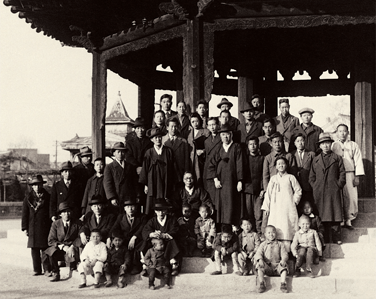 After returning homeland and whenever he did not have official schedules, Paikbum used to visit around in order to hear what people wanted to say. On this day, he visited Pagoda Park, exchanged open-minded opinions, and took a picture with them.
After returning homeland and whenever he did not have official schedules, Paikbum used to visit around in order to hear what people wanted to say. On this day, he visited Pagoda Park, exchanged open-minded opinions, and took a picture with them.
27th Anniversary of the Provisional Constitution of the Republic of Korea (Injeongjeon Hall of Changdeokgung Palace, 1946.4.11)
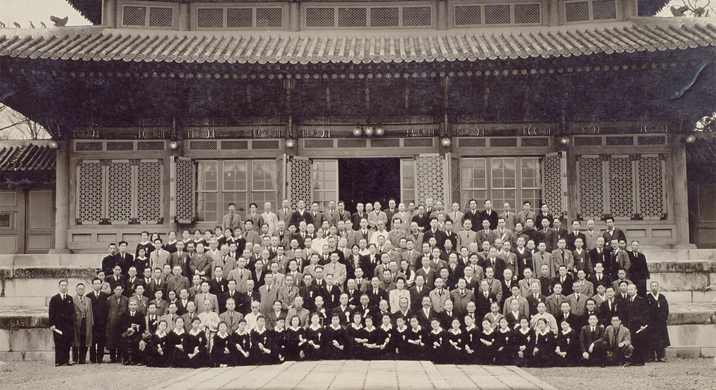
Visit to Yoon Bonggil’s Birthplace (Yesan, Chungnam, 1946.4.27)
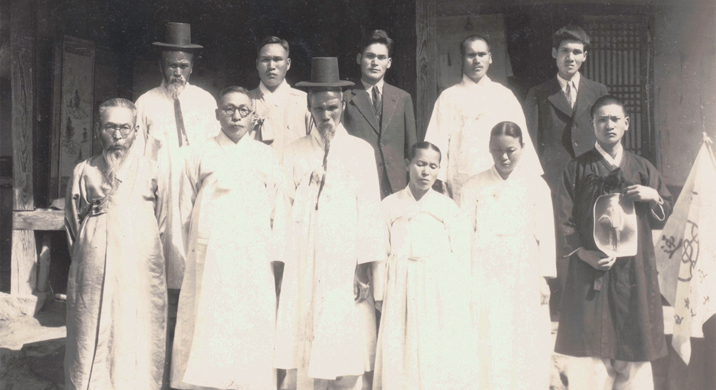
Second line, from left : Yoon Kyeong(uncle of Yoon Bonggil) · Yoon Sooneui · Yoon Nameui(brother of Yoon Bonggil) · Yoon Seongeui(brother of Yoon Bonggil) · Yoon Youngeui(brother of Yoon Bonggil)
Paikbum Kim Gu on His Way Back to Seoul with the Remains of Three Patriot Heroes (Lee Bongchang, Yoon Bonggil, and Baek Jeonggi) (1946.6.16)
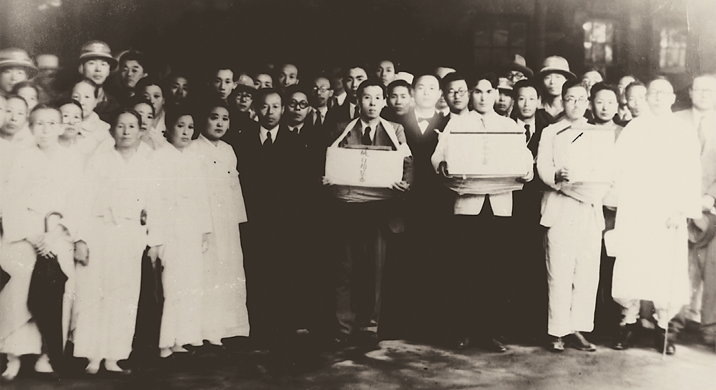
“… on letting the world learn the thorny journey taken by Koreans and trying to earn righteous recognition from the world, we started with clear awareness that although we were never in pursuit of violence, there was no other choices for us, while crossing the line of life and death in revolution, but to take this way to give the greatest impact with the least capacity.”
From Dowaesilgi
National Funeral for Three Revolutionaries (Hyochangwon, 1946.7.6)
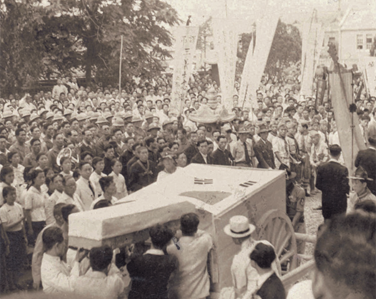 “And I requested my comrade Park Yeol in Tokyo, Japan, to bring the remains of the three patriot heroes of Yoon Bonggil, Lee Bongchang, and Baek Jeonggi to Korea … and to bury them in a place in Hyochangwon that I have reserved by myself. I will leave a place for An Joonggeun's ashes on top, and then the ashes of the three of them will be buried one after the other.”
“And I requested my comrade Park Yeol in Tokyo, Japan, to bring the remains of the three patriot heroes of Yoon Bonggil, Lee Bongchang, and Baek Jeonggi to Korea … and to bury them in a place in Hyochangwon that I have reserved by myself. I will leave a place for An Joonggeun's ashes on top, and then the ashes of the three of them will be buried one after the other.”From Paikbum Ilji
Paying His Respect at Hongreung(Royal Tomb of Gojong) (1946.7.20)
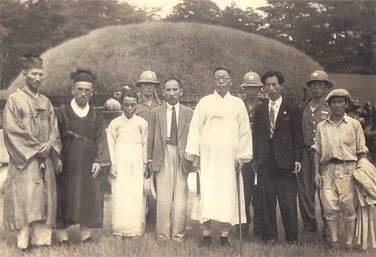 Paikbum Kim Gu was sentenced to death for the Chihapo Incident, but his life was spared when Gojong suspended the execution after Gojong’s learning that he was charged with the ‘murder for revenging assassination of Empress’, He paid a visit to the royal tomb of Gojong after returning to Korea.
Paikbum Kim Gu was sentenced to death for the Chihapo Incident, but his life was spared when Gojong suspended the execution after Gojong’s learning that he was charged with the ‘murder for revenging assassination of Empress’, He paid a visit to the royal tomb of Gojong after returning to Korea.
Civic Celebration for the 1st Anniversary of August 15 Peace and Liberation (Square of the U.S. Military Government, 1946.8.15)
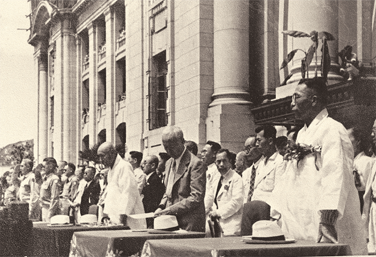 From Left : Hodge · Oh Saechang · Rhee Syngman · Cho Wangu · Kim Gu
From Left : Hodge · Oh Saechang · Rhee Syngman · Cho Wangu · Kim Gu Paikbum said that the ceremony is called the 'Dancer's Celebration' because we are not the hosts of the celebration, but are dancing at a banquet organized by others.
"... Independence is not achieved by relying on other powers, but only independence with self-reliance will bring about the relief of the people and the eternal prosperity of the nation.
From August 15 Congratulatory Remarks
Visiting the Tomb of Yoo Inseok (Gajeong Village, Chunseong, Gangwon-do, 1946.8.17)
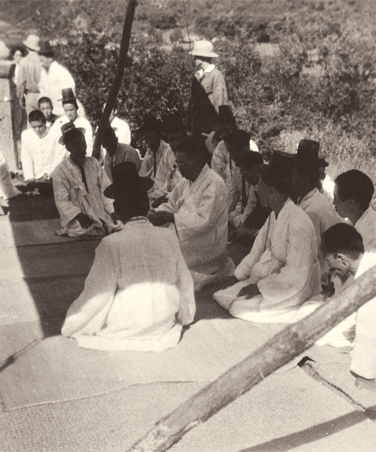 “In the old days, when the misfortune of the nation is coming, while gloomy cloud spreads out over the country, people expressed their worrisome emotion by crying, suiciding, fighting enemy, or various ways but in these days some of them respond to the nation’s crisis with sharing chats and even joyous mood. Whenever I see these bad phenomena, I, Kim Gu, often wished to correct them by his death, but I am still alive with the idea to exert more efforts until my natural death. To do so gives me more trouble although it brings happiness sometimes.”
“In the old days, when the misfortune of the nation is coming, while gloomy cloud spreads out over the country, people expressed their worrisome emotion by crying, suiciding, fighting enemy, or various ways but in these days some of them respond to the nation’s crisis with sharing chats and even joyous mood. Whenever I see these bad phenomena, I, Kim Gu, often wished to correct them by his death, but I am still alive with the idea to exert more efforts until my natural death. To do so gives me more trouble although it brings happiness sometimes.”From Funeral Oration for Yoo Inseok.
Visit to War-victims Camp in Busan (1946.9.14)
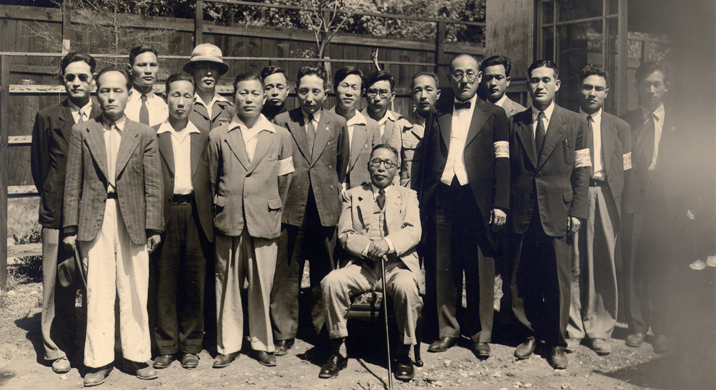
At right end : Seon Woojin
Visiting the Korean Coast Guard in Jinhae (1946.9.15~16)
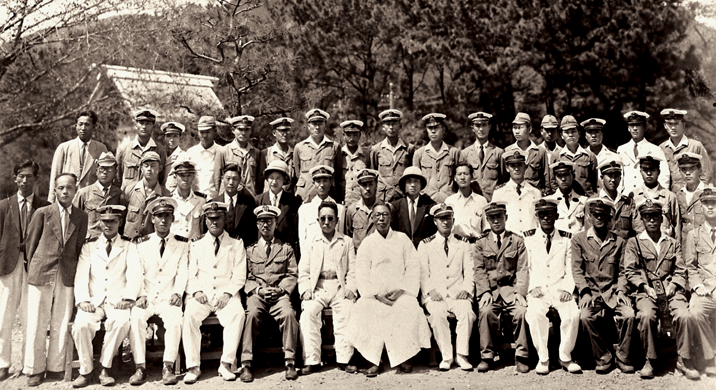
Second line, from left : Seon Woojin · Um Dohae · ○ · ○ · ○ · Lee Gilho · An Wooseng · ○ · ○ · Kim Kwangjoo · Lee Jaehyeon
Third line, from left : Jang Woosik · ○ · ○ · ○ · ○ · ○ · ○ · ○ · Shin Hyeonjoon · Kim Seokbeom · ○ · ○ · ○ · Kim Seongeun
Masan (1946.9.16)
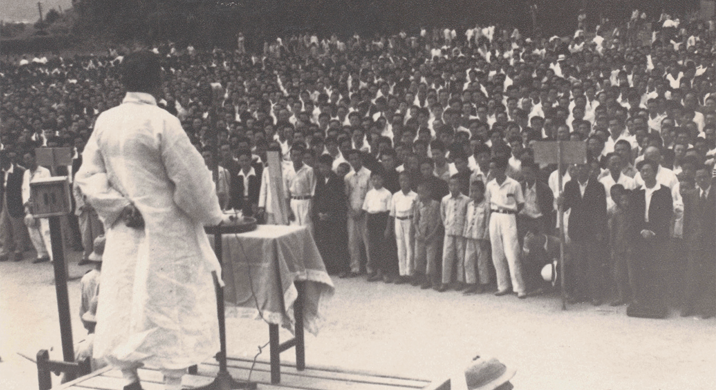
Hampyeong (1946.9.23)
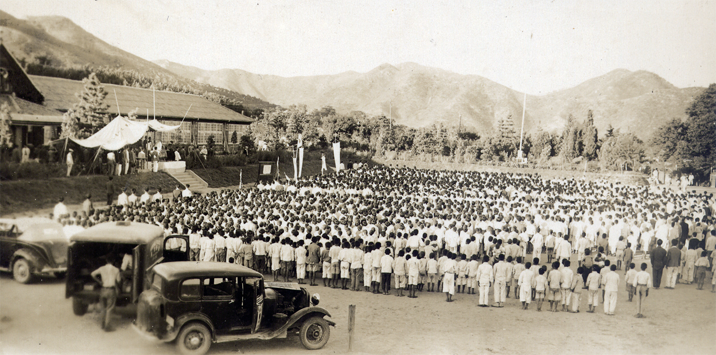
Paikbum Kim Gu and Woonam Rhee Syngman Posing for Photographers in front of Injeongjeon Hall after the Korean National Representative Congress (1947.7.15)
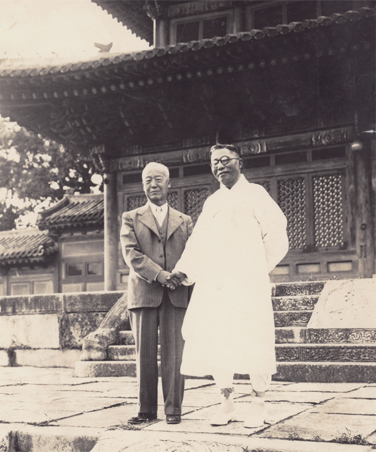
With 2nd Batch of the Training Camp for National Foundation (1947.11.30)
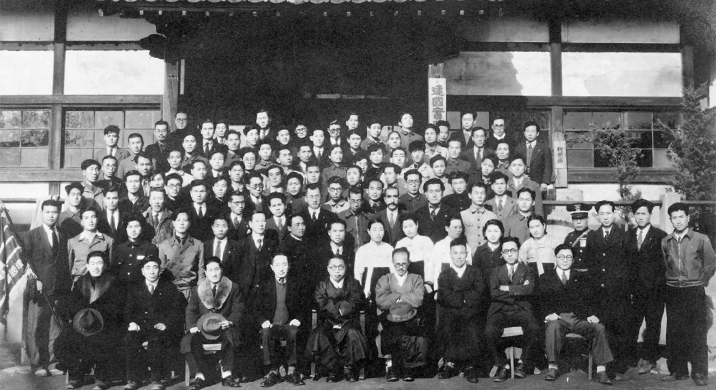
The platform of the Provisional Government of the Republic of Korea based on the Three Principles of Equality stipulates to develop human resources to found the nation after liberation. Accordingly, Paikbum Kim Gu founded the Training Camp for National Foundation and has trained people.
Meeting of the United Nations Temporary Commission on Korea (1948.1.26)
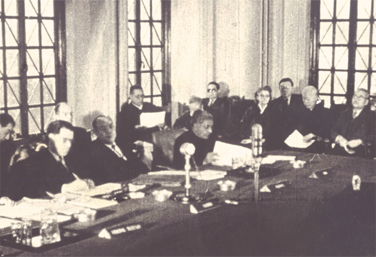 From left : Kim Gu · ○ · Franziska · Yoon Boseon · Rhee Syngman · Baek Kwansoo · Kim Byeongro
From left : Kim Gu · ○ · Franziska · Yoon Boseon · Rhee Syngman · Baek Kwansoo · Kim Byeongro"I oppose both the separate election for the South dividing our homeland and the People’s Republic for the North. I will continue to struggle only to hold the flag of justice and realize the reunification and complete sovereignty of my country with the overwhelming majority of patriotic compatriots."
From Quotation of Paikbum
《Comment letter to the UN Committee on Korea》
1. We demand the establishment of a unified and fully self-governing government of Korea by general election through the entire nation.
2. We demand that the general election be realized by the absolute free will of the people.
3. We demand that the United Nations not neglect its duties with an excuse of Soviet Union's refusal to enter North Korea.
4. We demand the release of all political prisoners already held in North and South Korea, or who are about to be arrested (including the release of Cho Mansik, who is imprisoned in North Korea).
5. We demand the immediate withdrawal of U.S. and Soviet troops, with the UN temporarily assuming security responsibility for the so-called vacuum.
6. We demand that a meeting of North and South Korean leaders be convened.
With Members of the United Nations Temporary Commission on Korea at Gyeonggyojang (1948.2.6)
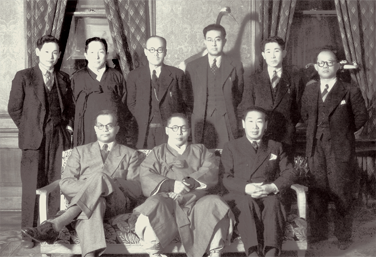 First line, from left : Chairman Menon(K.P.S. Menon) · Kim Gu · Director Hoo Chi-Tsai(胡世澤)
First line, from left : Chairman Menon(K.P.S. Menon) · Kim Gu · Director Hoo Chi-Tsai(胡世澤)Second line, from left : An Wooseng · Um Hangseop · Ji Cheongcheon · Choi Soongi · Kim Deokeun · Seo Younghae
“It is all a pretext and all unscientific observation to say that if the two armies withdraw, there will be a state of vacuum, the North Korean People's Army will attack and a civil war will break out. If the South suspects the North and the North suspects the South, the problem will be going on for centuries without being solved. If someone suspects the South, it will be the Soviet Union and if someone also suspects the North, it will be the United States. Anyone who voluntarily and repeatedly suspects the other on behalf of a foreign country is nothing more than an individual who exposes himself as an anti-nationalist for and puppet of the foreign country.”
From Quotation of Paikbum
Kim Gu Insisting on Building a Democratic, Unified, Self-governing, and Independent Korea to Those Who Oppose Inter-Korean Conference (1948.4.19)
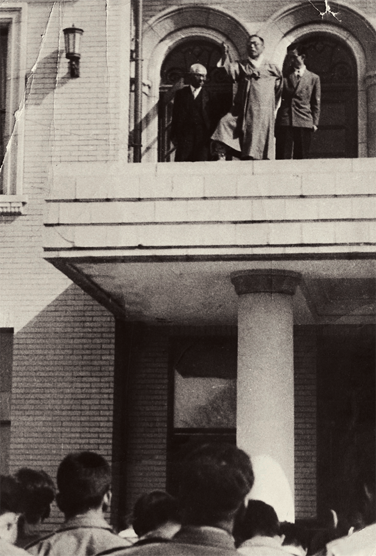 "Students are the heroes of the future. That's why they must become warriors who fight for justice. But what was your position before?
"Students are the heroes of the future. That's why they must become warriors who fight for justice. But what was your position before? What was your attitude when I was unjustly called to the witness stand of the U.S. Army’s martial court for the Jang Deoksoo case?
I learned then that you were indeed cowardly. If you were truly students fighting under the banner of justice or if you truly trusted and followed me, Kim Gu, why haven’t you ever protested against injustice at all?
I was so disappointed since then. Moreover, if a separate government is set up (in the South) and you work for it, you would certainly be such persons to arrest and abuse me to death. I am not talking about my personal feeling. Because I truly love Koreans, I am doing like this. You were enjoying a nap so to speak when I was trapped and unjustly thrown into quagmires but you wake up now and are spending sleepless days and nights in order to oppose what I am trying to do for the nation. What kind of manner is this?
Now I am on the way to the North to do right things for all the people on this land; however, you are interfering with it. It is really pathetic.
Once I determine to go, I will make it to do so. Return to your home and you’d better read some more pages of a book! For what you guys are here? I said you have to go but why are you still here! No one could force me not to go as I decided to go! Even if you are using the power of one-hundred cows in order to drag me back, I can’t change my mind!
I don’t mind whatever people are saying about me. I don’t mind even if Stalin’s agents are taking me to Siberia. Partisans in the North as well as Kim Il Sung share the same blood and bones of our forefathers with us. Anyhow, although it could be my last journey to the North, I have to meet brethren in the North with my burning passion.”
From Quotation of Paikbum
Paikbum Kim Gu and His Fellows on the 38th Parallel (Yeohyeon, Gyeonggi-do, 1948.4.19)
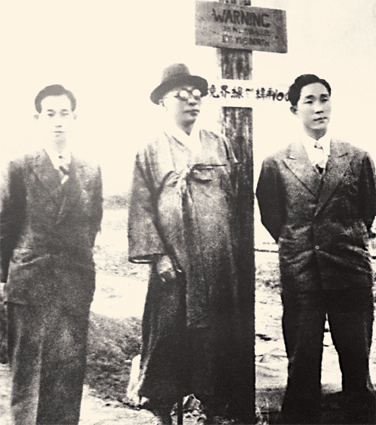 From left : Seon Woojin · Kim Gu · Kim Shin
From left : Seon Woojin · Kim Gu · Kim Shin“We can make the 38th parallel on our land broken down only after the 38th parallel in our mind is swept away. I, as a humble man, have devoted my whole life to the independence movement. Now I am seventy-two years old and what I have today is only time ticking to an end. In these circumstances, could I be greedy for wealth or honor, otherwise, for political power rested under the control of foreign military? The reason I support the Provisional and Korea Independence Party is for only independence and liberty of my country and people …. I am immediately ready to offer myself as a sacrifice on the altar whenever my country wants so. I will not lend a hand to establish the separate government in the South with an easy-going mind possibly rested in me; rather, I will choose to collapse on the 38th parallel in an effort to found unified Korea.”
From Quotation of Paikbum
Kim Gu, Reading a Congratulatory Remarks (Moranbong Theater in Pyongyang, 1948.4.22)
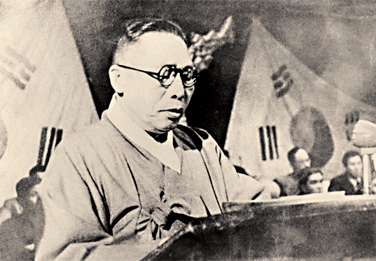 Congratulatory Address from the Inter-Korean Conference
Congratulatory Address from the Inter-Korean ConferenceDear Chairman and representatives of political parties and organizations!
It is my great honor to attend this grands meeting in order to save our country from the crisis of being divided and it is a great development in our history of the independence movement that passionate patriots gather in the same place and exchange opinions for the grand plan to achieve a unified independence with democratic self-reliance. How could a country exist without people, a political party, ideology, and organization without people? Therefore, at this stage, the sole and greatest mission of all Koreans is to accomplish unification and independence.
Anyhow, in these days, the biggest obstacle to interfere with unified independence is implementing the so-called separated general election and separate government in either or respective sides. Therefore, our common goal to fight against it should be to have the separate election and government frustrated. Not only should we oppose the separate election and government that divides our nation and ruins our people but we have to prevent occurrence of any relevant activities in any places any time.
Therefore, since we are here with the mission to frustrate the separate election and government, our success must be a victory of all people and accordingly this conference should be successful. I am confident that we would be successful if we deal with every issue honestly and sincerely.
Although international relations are complicated, I am confident that all relevant issues would turn to us favorably if we strive to gain goodwill and understanding of other nations with the unity of our people. If we could improve international relations in the way we mentioned above, it must be also a great contribution to the world peace.
I sincerely hope this conference would be successful since it is the way to complete unified independence of our nation as well as contribute the world peace. I would like to pray for your future endeavors at the same time.
Ulmil Pavilion in Pyongyang (1948.4.22)
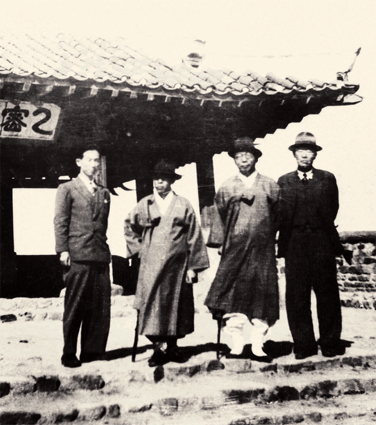 From left : Seon Woojin · Kim Kyusik · Kim Gu · Won Saehoon
From left : Seon Woojin · Kim Kyusik · Kim Gu · Won Saehoon"Many of our friends have asked us what strategies we prepared for this conference. However, we were promised in advance that we would not draw up a special plan, but would come to the conference without preparation. because, to construct democratically unified and self-reliant independent nation, that is, for us at the stage of achieving unified independence with democracy and self-reliance, we already have clearly stipulated our principles and lines.”
From Quotation of Paikbum
Lunch at the Foot of Jeongbang Mountain near Sariwon, Hwanghae-do on the Way Back to Seoul (1948.5.4)
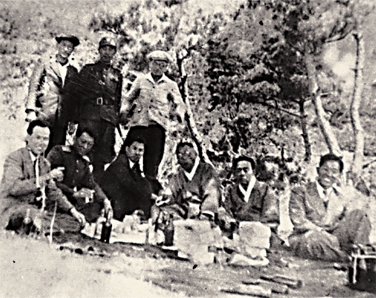 From left : Song Namheun · ○ · Kim Younghui · Kim Gu · Kim Kyusik · Kim Shin
From left : Song Namheun · ○ · Kim Younghui · Kim Gu · Kim Kyusik · Kim Shin"We are in a revolutionary period to win independent sovereign with all people’s unity, and a lot of difficulties are laid ahead of us because a revolution is to defeat a strong power by a weaker power. However, a revolutionary should realize that he is the one who has only one choice to strenuously struggle until he achieve his goal that is to realize justice and his strong belief for the society of mankind. A revolutionary must maintain optimistic attitude and live in such an environment.”
From Quotation of Paikbum
Leaders of the Korea Independence Party Welcoming the Representatives Returning from the Inter-Korean Conference (Gyeonggyojang, 1948.5.20)
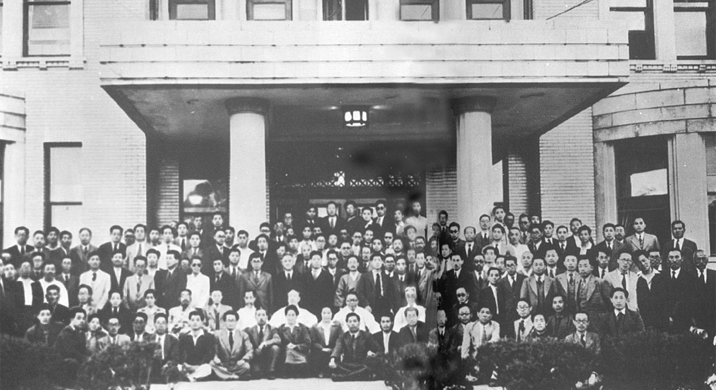
"Our country is now standing at a watershed moment of independence, subordination, or reunification. We, who are faced with such a dead-end moment, for the sake of the honor of the nation and the pride of the cultural people, want to support the right movement for true national independence by clarifying the national cause and the path of national pride...
Leaders of the advanced North and South! Move forward with the trust of constant support from rearguards! True freedom and independence, true civil rights and democracy! Let's beat the drum high in the stream of history! Complete independence without trusteeship! In this close call, we’ve heard the "true voice" of the people. We’ve heard the "self-sound" of the nation itself. As a stride of the national movement for the principle of self-determination, the righteousness of coexistence, and the practicality of collaboration, we heard the ‘giant whistle of the North-South conference.’ If you heard the proposal of the South and the response of the North, you’ve hear the drum of the united Korea in response.”
From Supporting Statements for Inter-Korean Consultative Conference of 108 Literary Figures
Visit to Silleuksa Temple, Yeoju, Gyeonggi-do (1948.6.25~26)
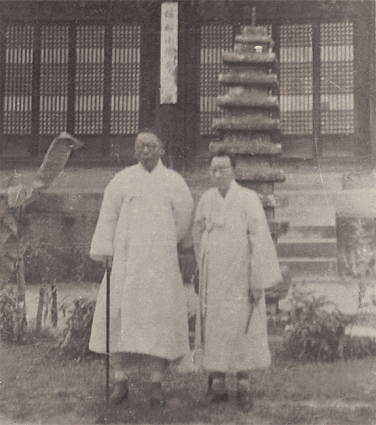 Kim Gu · Kim Kyusik
Kim Gu · Kim Kyusik
Reburial Ceremony of Lee Dongnyeong and Cha Riseok (Whimoon Middle School, 1948.9.22)
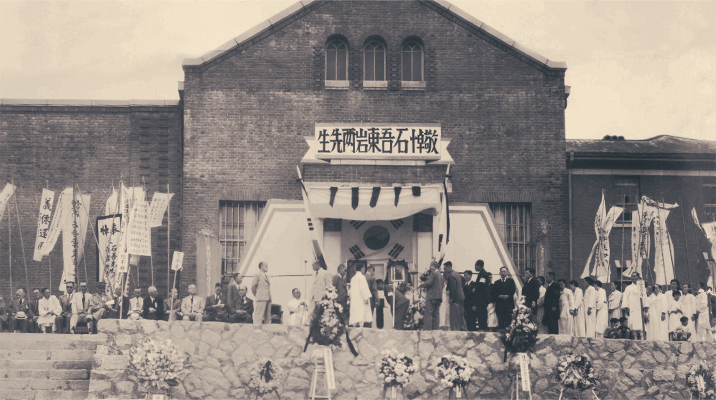
Dr. and Mrs. Fitch, who Provided Refuge to Paikbum Kim Gu after Yoon Bonggil’s Patriot Action (1948)
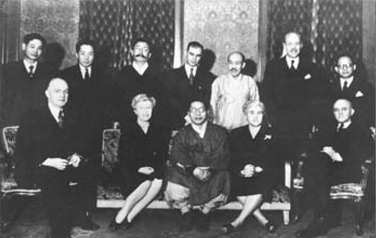 First line, from left : ○ · wife of Dr. Fitch · Kim Gu · ○ · ○
First line, from left : ○ · wife of Dr. Fitch · Kim Gu · ○ · ○Second line, from left : An Wooseng · Um Hangseop · Yoo Rim · ○ · Hong Myeonghee · Dr. Fitch · Seo Younghae
Opening Ceremony of Paikbum Academy (Geumho-dong, 1949.1.27)
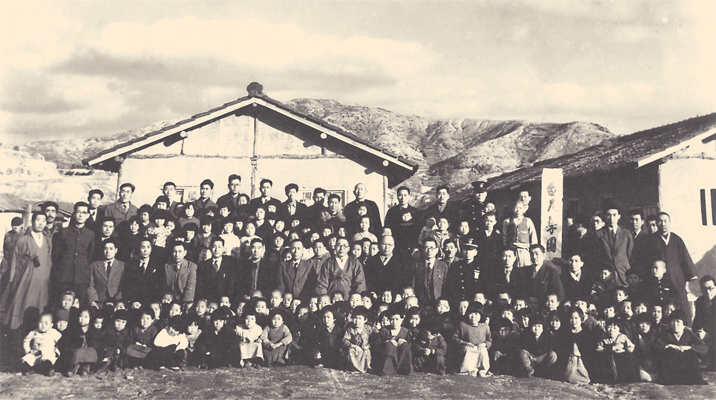
Opening Ceremony of Changam Academy (Yeomri-dong, 1949.3.14)
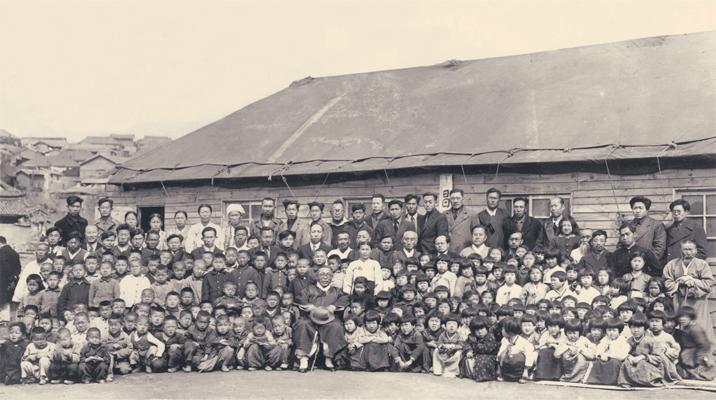
Photo with Members of the Jeonbuk Province Section of the Korea Independence Party (Jeonju Hyanggyo, 1949.4.2)
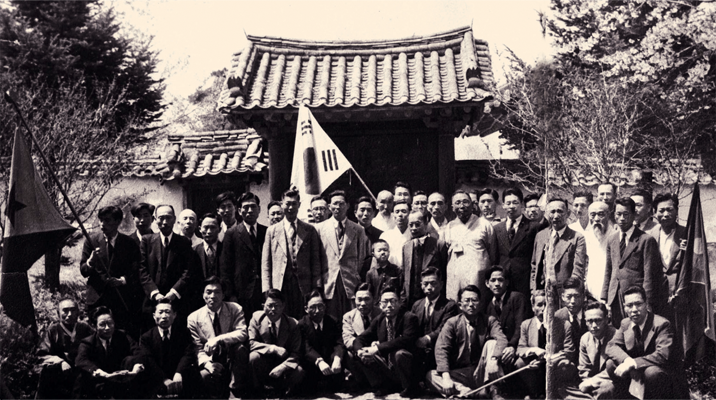
Celebrating the 2nd Graduation of Sungkyunkwan University's College of Associate Degree (1949.6.22)
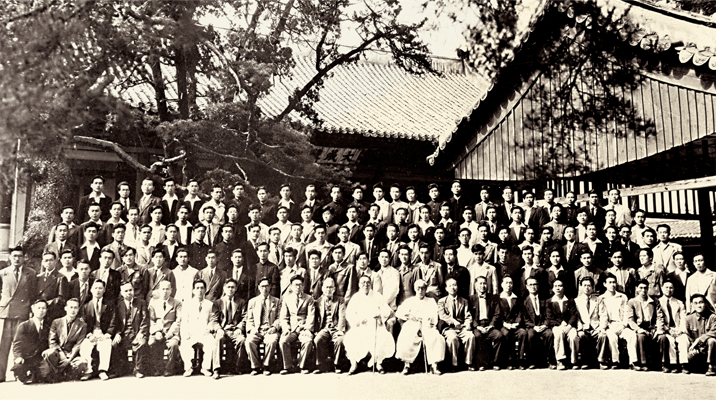
The Courtyard in front of Gyeonggyojang, Seen through the Window where the Bullet Went Through (1949.6.26)
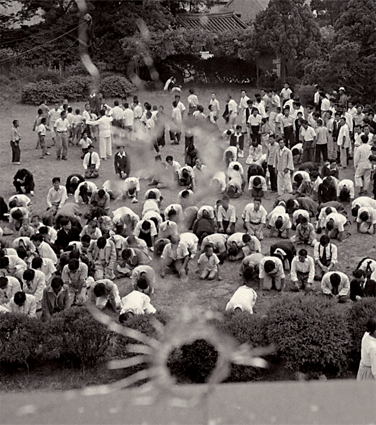 'No matter how good the Soviet-style democracy may be, I don't like communist dictatorships. No matter how good American democracy may be, we cannot support the marketization of less-developed nations in favor of monopoly capitalism at the expenses of isolating proletariat. We truly want nothing more than to have a sovereign, independent homeland based on equality in politics, economics and education where we enjoy our lives for the benefit of thirty million people while we promote goodwill and equality altogether in the international society. I want, moreover, not a fatherland of divided in half, but a fully united one.
'No matter how good the Soviet-style democracy may be, I don't like communist dictatorships. No matter how good American democracy may be, we cannot support the marketization of less-developed nations in favor of monopoly capitalism at the expenses of isolating proletariat. We truly want nothing more than to have a sovereign, independent homeland based on equality in politics, economics and education where we enjoy our lives for the benefit of thirty million people while we promote goodwill and equality altogether in the international society. I want, moreover, not a fatherland of divided in half, but a fully united one.From Quotation of Paikbum
Immediately After Death (1949.6.26)
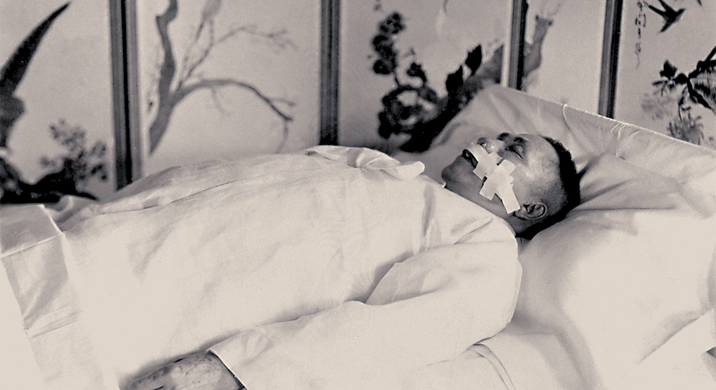
From Quotation of Paikbum
March of the National Funeral (1949.7.5)
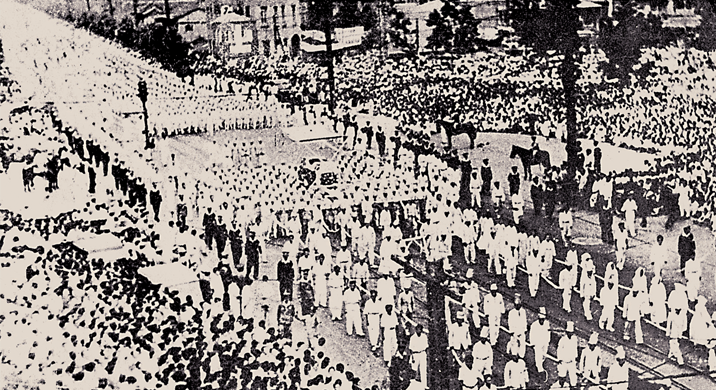
Sir!
Now that you are gone, what can we say? We can only wail. We cry and cry again, nothing can be spelled out but tears. Although heaven sent you to this earth to save this nation, there was nothing but hardship and persecution throughout your 74 years of life. You had left your life of youth, honor, glory and comfort behind, gone to the far-away foreign lands, and you have devoted your life only to the liberation of homeland with your burning passion. If we look back at what you have done during your life time, it is easy to learn that it would never be coincident that we are living in a liberated country.
No one can deny that your great achievement is laid here, along with all other righteous patriots shedding the blood of loyalty for the nation in history. We cannot forget that you were as much happy as dancing with full of joy in your face when you were returning home with but white hair on your head which was changed from the black at the time you left home.
However, who could we anticipate it? Our land is divided into two, the stream of ideology is separated into the right and the left while conflicts between our people is getting bitter, and thus the light of hope is getting dimmer; however, encountering these incoming currents, you have cried out for the unified country and complete sovereignty until your tongue was worn out while you lived in frugality having a dish of soup and a pieces of kimchi for a meal.
This is what you have been doing all your life, and now you have passed away at the hands of your own people, not your enemies. Is this the last reward we can give to you? Fellow countrymen! Beat your hearts and wail. Is this the only gift we can give to him?
Sir! Sir! We have listened to your words of concerns for the people every evening, and from tonight who will give us such words? We have seen your face every morning, but from tomorrow morning where should we go to see you? Even if you want to leave us, we won’t let you go! Those who are left behind are like sheep without a shepherd; how can you forsake a people like us to go far away? The sky is dark and the mountains are desolate. Angry and resentful thoughts fill our hearts and overflow, rolling like waves of the sea. Here we are, speaking in a thousand tongues, all are useless. You are gone, and what can we say, we can only wail. Crying, crying, crying again, crying, crying, and nothing but crying. Here for a moment we think of the words '月印千江(weol-in-cheon-gang: The moon is reflected in a thousand rivers)'. When we think of it again, you have never gone away. You are in the hearts of 30 million compatriots. Your body might go back to earth and your soul would go to heaven, but your thoughts and spirit will eternally live on in this nation and in the history. By this, there will be a budding and a blossom from generation to generation since you, as a patriot who have devoted your life to Koreans with ordeal, may not be gone away as if blown by the wind. Your holy sacrifice will open the first page of the new history of the nation's reunification and liberal democracy. We pledge to your great spirit that we will follow in your footsteps and live for the sake of the nation until the very end, fulfilling the beautiful and noble duty of being your followers.
On the Sidewalk as the March of the National Funeral Passes by (1949.7.5)
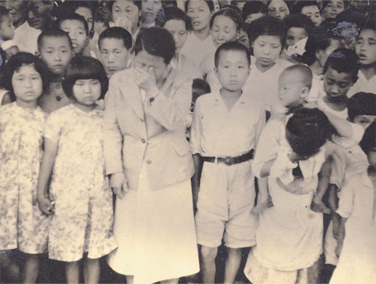 噫! 白凡先生 (Lamenting!, Sir Paikbum)
噫! 白凡先生 (Lamenting!, Sir Paikbum)朴斗鎭 (Baek Doojin)
There was a towering rock.
You have endured the fierce blizzard, the fierce windstorm.
You rose up like a high green mountain,
But crumbled like a mountain falls,
Like an enormous rock falls,
The whole nation weeps deeply in the heart.
You parried harms with your hot, beating heart for the nation,
but with one bullet from the enemy in your heart
Ah! You have crumbled from a bullet of your people.
Leaving the country to retake the country,
You have spent fifty years with such hardships,
Looking and touching the mountains of your homeland like your own flesh.
With dew as your meal,
and grass as your bed.
In front of the enemies and injustice,
You were a raging billow, a fighting storm,
A flame that stir up the wind.
Without seeing the accomplishments of the nation,
With holding the people in your heart,
Like a mountain falls, like a wind falls asleep, like the tide rests,
You closed your eyes.
ㅡOne day, if there is someone
Who claims to love one’s country,
Put a hand on your chest
And ask yourself,
Have you lived the life of Paikbum.
If you can’t answer,
Do not assume anyone loved one’s country―
Statue of Mother Kwak Nakwon (1949.8)
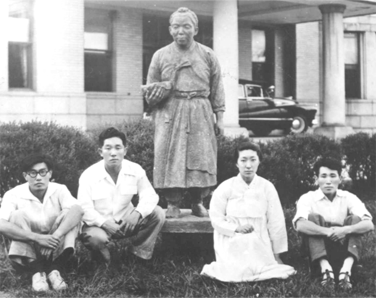 From left : Park Seunggoo(art teacher of Seoul Middle School, the statue creator) · Kim Shin · Lim Yoonyeon(wife of Kim Shin) · Kim Deokeun
From left : Park Seunggoo(art teacher of Seoul Middle School, the statue creator) · Kim Shin · Lim Yoonyeon(wife of Kim Shin) · Kim Deokeun“I am more pleased with you now than you would have become the Governor of Gyeonggi Province. Only one person can visit you inside, so your wife and Hwakyeong(Paikbum’s daughter) are just outside. Don’t worry about three of us as we are fine. Take care of yourself in prison. If you are in need of food, I will bring in private food twice a day.” What a respectable woman my mother is! How could she be so cool with the fact that her son was sentence for seventeen years in prison! However, when she returned from her visit, her tears would have flooded from her eyes, blinding her from seeing her feet.
From Paikbum Ilji
Statue Erected on Namsan on the 20th Anniversary of Paikbum Kim Gu’s Death (1969.8.23)
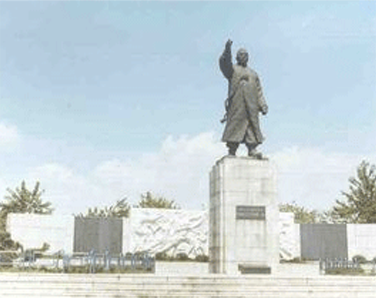 The meaning of erecting a statue of Paikbum
The meaning of erecting a statue of Paikbum Among the countless patriotic leaders of the Korean independence movement, Paikbum Kim Gu was the Big Dipper with ten thousand stars around in the dark night sky and he had the majestic posture as if he were a high mountain having steep cliffs and huge rocks in which pine trees rooted and stood on it even in a snowy blizzard. After the liberation of Korea, he made great efforts reunify the North and the South, which were divided into two. However, we are so sad that but he was unable to accomplish the task of reunification and was martyred at noon on June 26, 1949 with the deep-rooted enmity in his heart. On the 20th anniversary of his martyrdom, we, the Association of Commemorative Services of Patriot Kim Gu, erected a statue of his great figure as an exemplary leader for the next generations. We hope to inspire future generations to emulate his righteous spirit.


 > Paikbum Data > Photo
> Paikbum Data > Photo Photo
Photo